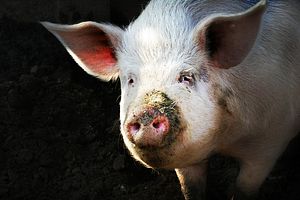On September 6, the Food and Agriculture Organization of the United Nations (FAO) called a three-day emergency meeting in Thailand to examine the outbreak of African swine fever (ASF) in China, aiming to curb the spread of ASF to China’s neighboring countries in Asia.
Just one day earlier, China’s Ministry of Agriculture and Rural Affairs (MoARA) announced that ASF has broken out in Jiamusi, a prefecture-level city in Heilongjiang province that borders Russia. The epidemic has killed a total of 12 pigs and sickened 39 in one local farm, MoARA said.
This marks the ninth case of ASF that has been reported in China since August 1, when the virus was first detected in the country. So far, China has confirmed nine ASF cases all over the country in six provinces, including Heilongjiang, Anhui, Zhejiang, Jiangsu, Henan, and Liaoning.
According to the FAO, ASF is one of the most devastating diseases affecting pigs, though it poses no direct threat to human health. Highly contagious, the disease can spread through direct or indirect contact and causes high mortality, while the virus can persist for a long time in the environment and in a variety of swine products. Currently, there are no vaccines available.
On September 2, MoARA spokesperson Guang Fude revealed that the relevant provinces have already culled as many 40,000 pigs as of September 1.
“Judging from the current situation, although the situation in China is complicated and the task of prevention and control is extremely arduous, the current epidemic is generally under control,” Guang added.
However, the FAO apparently believes the ASF outbreak is more daunting than the Chinese government has admitted, especially considering that China produces more than half of the world’s pigs.
In fact, early in March, the FAO had already warned China about the ASF risk by publishing a report under the title of “African swine fever threatens People’s Republic of China.” This report noted that ASF in East Asia was first detected at a pig farm in the Siberian region of the Russian Federation in March 2017.
“Entry of ASF into China would have devastating consequences for animal health, food safety, and food security, and raise the possibility of further spread to Southeast Asia including the Korean Peninsula and Japan,” the report highlighted. “China’s northeastern region (Heilongjiang province) is where ASF is most likely to be introduced, followed by Inner Mongolia.”
Now in an attempt to contain the already-spreading outbreak within China, the FAO called worldwide specialists, particularly those from China and its neighboring countries — Cambodia, Japan, Laos, Mongolia, Myanmar, the Philippines, South Korea, Thailand, and Vietnam — to the emergency meeting.
“It’s critical that this region be ready for the very real possibility that ASF could jump the border into other countries,” said Wantanee Kalpravidh, regional manager of the FAO Emergency Center for Transboundary Animal Diseases in Asia.

































